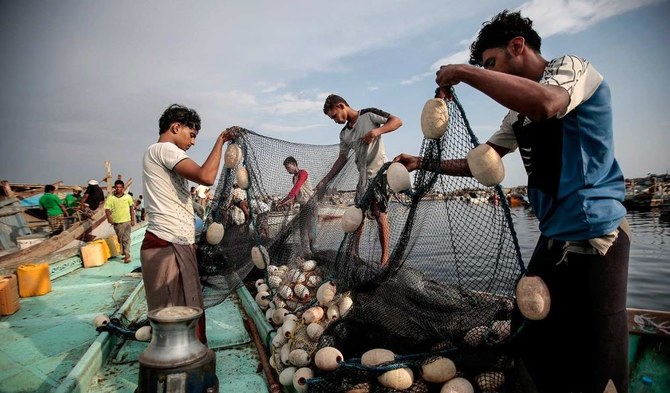AL-MUKALLA: Fifty-four Yemeni fishermen held for a year in an Eritrean prison center on Sunday returned home after being freed by authorities in the East African country.
The men had been detained in the port city of Massawa following their arrest by the Eritrean navy while fishing in the Red Sea.
It was the second group of fishermen released by the Eritreans to arrive in Yemen’s western city of Hodeidah, after 29 landed last week.
They claimed their boats and other goods were seized when they were apprehended.
Eritrea has agreed to set free a further 39 fishermen held for two months in Assab, according to their colleagues.
One fisherman from Khokha, who wished to remain anonymous, told Arab News: “The Eritrean authorities have issued us an official release notice. And we are prepared to send a boat (from Yemen) to Eritrea to bring them home once the strong winds have dropped.”
He added that many of the fishermen who had returned home were in urgent need of financial help to support themselves and their families.
Yemen and Eritrea fought a short war in 1995 over the Red Sea Hanish islands. Despite an international court ruling granting Yemen sovereignty over the islands, tension between the two nations has remained.
Meanwhile, the UN’s International Organization for Migration has released data showing that more than 93,000 African migrants entered Yemen between January and October of this year, exceeding the figure of 73,000 for the whole of 2022.
The IOM said that military and security operations against human traffickers along the coast of the province of Lahj three months ago had resulted in a considerable decrease in the number of African arrivals in Lahj.
In August, Arab News reported that authorities in Lahj province launched a coordinated military operation against people and drug-smuggling gangs in the Red Sea coastal region of Ras Al-Arah, in collaboration with the Giants Brigades, that resulted in the rescue of hundreds of African migrants, the capture of their captors, and the confiscation of firearms.
In its latest Displacement Tracking Update report, released on Saturday, the IOM said: “Since the joint military campaign began three months ago, the number of migrants entering Yemen through the coast of Lahj has been steadily decreasing.
“The decrease reached its highest point in October when no reported migrants were entering Yemen via this route.”
Despite a drop in migrant arrivals in Lahj since August, the number of migrants crossing into the southern province of Shabwa jumped by 17 percent in October to 1,169, up from 1,003 in September.
The IOM recently reported that more than 64 African migrants were missing after their boat sank off the coast of Yemen on Nov. 12. Ninety migrants, including 60 women, were onboard the vessel sailing from Djibouti in East Africa to Yemen when it capsized near to the Yemeni shoreline in the Bab-Al-Mandab Strait.


























